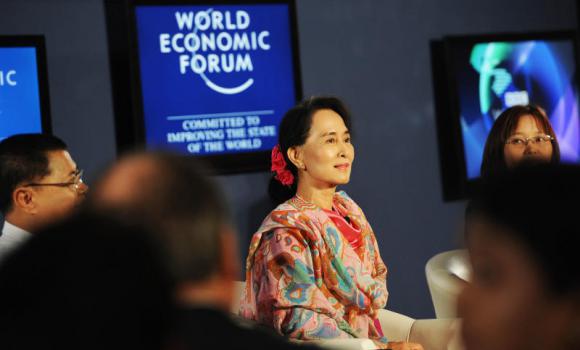
Naypyidaw/Myanmar, Jun 6: Myanmar opposition leader Aung San Suu Kyi on Thursday declared her intention to run for president, calling for all of the country's people to share the fruits of its dramatic reforms.
Addressing the World Economic Forum (WEF) on East Asia in the capital Naypyidaw, the Nobel Peace laureate appealed for the amendment of the military-drafted constitution which prevents her from leading the country.
“I want to run for president and I'm quite frank about it,” the veteran democracy activist told delegates, as she sets her sights on elections due to be held in 2015.
“If I pretended that I didn't want to be president I wouldn't be honest,” she added.
The current constitution blocks anyone whose spouses or children are overseas citizens from being appointed by parliament for the top job.
Suu Kyi's two sons with her late husband Michael Aris are British and the clause is widely believed to be targeted at the Nobel laureate.
Changing certain parts of the text requires the support of more than 75 percent of the members of the fledgling parliament, one quarter of whom are unelected military officials, she noted.
“This constitution is said by experts to be the most difficult constitution in the world to amend. So we must start by amending the requirements for amendments,” Suu Kyi said.
President Thein Sein's quasi-civilian government has surprised the world since coming to power two years ago with dramatic political and economic changes that have led to the lifting of most Western sanctions.
Hundreds of political prisoners have been freed, democracy champion Suu Kyi has been welcomed into a new parliament and tentative cease-fires have been reached in the country's multiple ethnic civil wars.
Suu Kyi, who was herself locked up by the former junta for a total of 15 years, remains hugely popular in Myanmar and her National League for Democracy party is widely expected to win the elections if they are free and fair.
The opposition leader called for all of the Myanmar people to be included in the reform process, warning that otherwise the changes could be jeopardized.
“If the people feel that they're included in this reform process then it will not be reversible — or at least it will not be easily reversible,” she said.
“But if there are too many people who feel excluded then the dangers of a reversal of the situation would be very great,” Suu Kyi added.
Some 900 delegates from more than 50 countries are gathered in the capital Naypyidaw for the three-day WEF on East Asia — a regional edition of the annual gathering of business and political luminaries in the Swiss resort of Davos.
Foreign firms are queuing up to enter the country formerly known as Burma, tantalized by the prospect of a largely untapped market with a potential 60 million new consumers in addition to Myanmar's pool of cheap labor.
But experts say businesses entering Myanmar face major hurdles, including an opaque legal framework as well as a lack of basic infrastructure and government and private-sector expertise.
“Look at the poverty in the country,” said Martin Sorrell, chief executive of British advertising giant WPP.
“As you land you look at this capital and you see oxen and ploughs. And getting the balance right I think in terms of expectation is critically important because it's going to build expectations to a level... which I think will be unrealistic,” he said.
The forum is a huge logistical challenge for Myanmar's government, which is more used to hosting smaller business and diplomatic delegations as well as the occasional influx of Chinese visitors for jade emporiums.
For many of the delegates, it is also their first glimpse of the sprawling capital built in secret by the former military rulers, who surprised the world in 2005 by suddenly shifting the seat of government from Yangon.
Home to luxury hotels, broad roads and even a 20-lane boulevard leading to the new parliament, the city's lack of nightlife, restaurants and cafes has not gone unnoticed by delegates.
“Traffic conditions is very nice,” one Korean delegate said of the city's near empty multi-lane highways. “Here no traffic — but nowhere to go.”





Comments
Add new comment